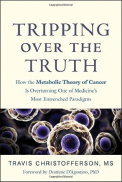BOOKMARK
Title: Tripping Over the Truth: How the Metabolic Theory of Cancer Is Overturning One of Medicine’s Most Entrenched Paradigms
Author: Travis Christofferson, MS
Publisher: Chelsea Green Publishing
Publication Date: February 2017
Price: $24.95, hardcover; 288 pages

Bringing a book to market is a long, precarious, and risky business. It begins and ends with gatekeepers: a literary agent who proffers a project and an editor at a publishing house who buys it. Today, with the advent of self-published books, or “indies,” anyone with a few bucks can become a “published” author.
Frustrated by multiple rebuffs from commercial publishers, science writer Travis -Christofferson self-published Tripping Over the Truth: How the Metabolic Theory of Cancer Is Overturning One of Medicine’s Most Entrenched Paradigms. It is a well-written and thought-provoking book, one that publishers missed out on.
Tripping Over the Truth is arranged in 7 parts, during which the author takes the reader on a 100-year cancer journey, beginning with the London chimney sweep’s cancer, also called soot wart, in which the first environmental carcinogen was identified. Mr. Christofferson does a good job weaving anecdotes and science as he builds his book from Virchow to DeVita, carefully explicating the difficult process of scientific discovery, as exemplified by the hard-won triumph of trastuzumab (Herceptin). He was at the 1998 ASCO Annual Meeting, when Dr. Dennis Slamon gave his groundbreaking presentation on that drug. There are times when the author can’t resist the temptation to editorialize, but they are infrequent enough.
Provocative Ideas
The colorful battles in cancer will not be new to readers of The ASCO Post, but history is simply a backdrop to the book’s central narrative tension over the theory of cancer: genetic or metabolic? Like all things, especially in science, answers to complex questions are nuanced.
The colorful battles in cancer will not be new to readers of The ASCO Post, but history is simply a backdrop to the book’s central narrative tension over the theory of cancer: genetic or metabolic?—
Tweet this quote
The hero of the book is Otto Warburg, a German medical doctor and Nobel Laureate who, in 1924, first developed the theory of cancer being a metabolic disease, claiming that cancer cells have a perverted method of generating energy, by truncating the conversion of glucose. According to Dr. Warburg, cancer cells depend much less on the efficient process of respiration using oxygen, instead of relying on the inefficient pathway of fermentation. In a 1966 lecture, he commented, “Cancer, above all other diseases, has countless secondary causes. But, even for cancer, there is only one prime cause, [which is] the replacement of the respiration of oxygen in normal body cells by a fermentation of sugar.”
Dr. Warburg’s theory, although highly provocative, never gained traction among the scientific community, and when he died in 1970, his theory was all but forgotten. Noted cancer researcher Sidney Weinhouse, MD, was said to have put the nail in the metabolic coffin in a 1976 review, in which he wrote, “The whole conception of cancer initiation or survival by ‘faulty’ respiration and high glycolysis seems too simplistic for serious consideration.”
Genetic Heavyweights
Then, in 1989, Drs. Michael Bishop and Harold -Varmus were awarded the Nobel Prize for their discovery of the cellular origin of retroviral oncogenes as a cause of cancer. The author tries to stir a solid debate on the metabolic vs genetic cause of cancer, but the genetic heavyweights have a stacked deck—that is, until, Mr. Christofferson gets the inimitable “Father of DNA” himself, Dr. James Watson, to weigh in.
The author cites a 2009 article in The New York Times, where Dr. Watson wrote, “[W]e still do not have the ‘miracle drugs’ that … would stop most metastatic cancer cells in their tracks. To develop them, we may have to turn our main research focus away from decoding the genetic instructions behind cancer and toward understanding the chemical reactions (metabolism) within the cells.”
Along with the main battle of theories, the book has some fascinating case histories and a worthwhile section on diet. Does the author convince serious science readers that Dr. Warburg was right all along? No, of course not. But there is much within the covers of this book that makes one point clear: Closed minds and dogma have damaged scientific progress from the time of the Enlightenment through today. This book is a worthwhile read for The ASCO Post’s audience. ■

